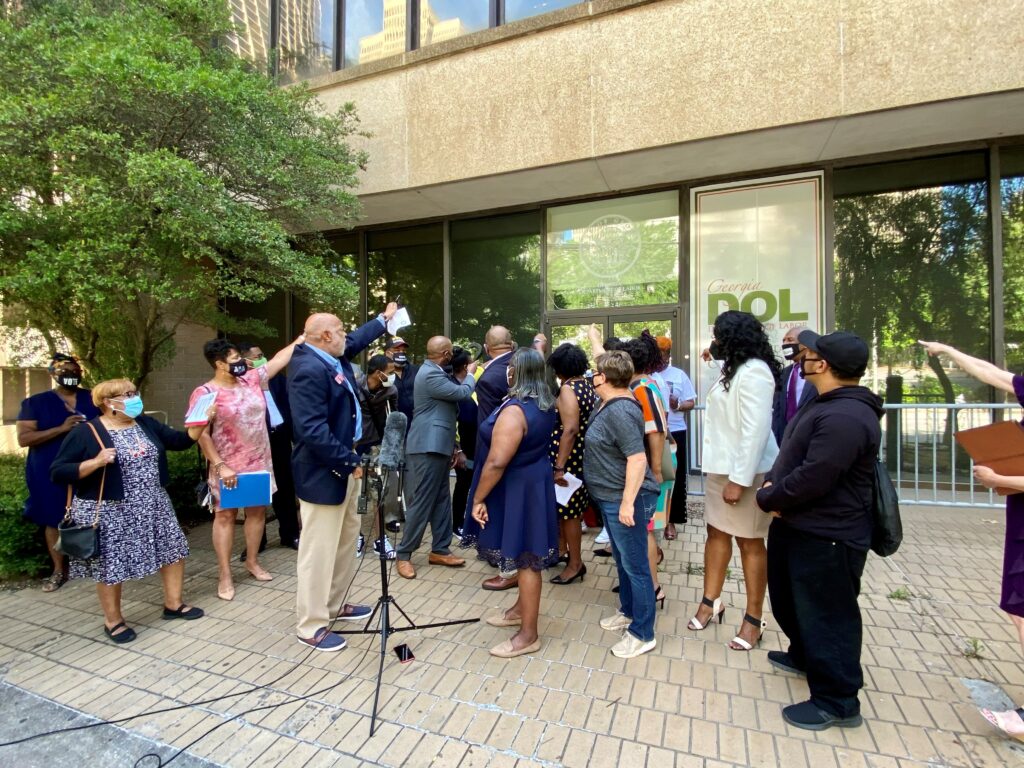
Labor advocates and state lawmakers in Georgia called on Gov. Brian Kemp Wednesday to reverse his decision to end expanded federal unemployment benefits next month, saying the move would hurt low-wage workers during the COVID-19 pandemic.
The governor’s announcement last week that he will end the extra federal $300 weekly unemployment checks on June 26 sent shock waves through many Georgia communities where unemployed workers have relied on the added benefit for months to cover rent, food and utility bills.
Local labor leaders protested Kemp’s decision outside the state Department of Labor building in downtown Atlanta, arguing the loss of the $300 per week would cripple many Georgians still struggling to find work during the pandemic.
They also questioned where the abandoned federal dollars would go instead since the Biden administration has authorized the additional federal benefit to remain into September.
“This is not the time to take away benefits from families,” said Nancy Flake Johnson, president and CEO of the Urban League of Greater Atlanta. “To take these modest resources away from families now is nothing less than inhumane.”
Kemp and opponents of the extra federal benefit have argued the $300 checks have incentivized many jobless Georgians to avoid rejoining the labor market, putting strain on local businesses still recovering from more than a year of economic damage caused by the pandemic.
State labor officials plan to nix several federal pandemic unemployment programs on June 26 along with the $300 extra benefit including an additional $100 for Georgians with mixed earnings, an extension on regular benefits and assistance for self-employed, part-time and gig workers.
“As we emerge from this pandemic, Georgians deserve to get back to normal,” Kemp said in a statement last Thursday. “And [last week’s] announced economic recovery plan will help more employees and businesses across our state do so.”
Critics accused Kemp of glazing over ongoing difficulties many out-of-work Georgians have faced while searching for new jobs or going months without their unemployment claims being processed.
Marcellus Rowe, a former public-transit worker in Atlanta, said he has had a tough time finding comparable work after losing his job in November 2019. The $300 federal benefit has been crucial to helping keep his finances afloat, he said at Wednesday’s protest.
“We are tired and frustrated,” Rowe said. “And as a Black man, begging and pleading are no longer options.”
Several labor advocates and Democratic lawmakers slammed Georgia Labor Commissioner Mark Butler, a Republican who – like Kemp – faces reelection next year. They criticized the continued closure of state labor offices due to the pandemic while Georgians are being asked to return to work.
“We all know that this system is broken and needs transparency,” said state Rep. Kim Schofield, D-Atlanta. “If you want people to be able to go to work and look for work, open these doors.”
Butler has said his office pushed to process nearly 5 million unemployment claims that have drawn an average of 60,000 phone calls a day from out-of-work Georgians, all with shorthanded staff and a tight budget that lawmakers left largely unchanged during the 2021 legislative session that ended March 31.
“We may have had to process a lot of claims, and had a lot of work,” Butler said in an email Thursday. “But we do not struggle at what we do. We’re very good at what we do.”
Even so, Butler has echoed Kemp in framing the extra federal benefit as a damper on attracting workers back to the labor market, noting also that his agency has distributed nearly $22 billion in benefits since the pandemic broke out.
“Right now, the state has a historic number of jobs listed on Employ Georgia,” Butler said in a statement last week. “We are seeing some of the highest pay scales with enhanced benefits and signing bonuses.”
But labor advocates and lawmakers rejected the argument that laid-off and furloughed workers are to blame for the labor issues, stressing that even with jobs many Georgians do not earn enough to make ends meet because of the state’s $7.25-per-hour minimum wage.
“What we hear from our leaders is blame, false assumptions and downright disrespect,” said state Sen. Tonya Anderson, D-Lithonia, who chairs the Georgia Legislative Black Caucus. “Georgia will never progress if our workers are not prioritized.”
This story was updated to clarify Commissioner Butler’s comments on his office’s efforts to process unemployment claims during the pandemic.